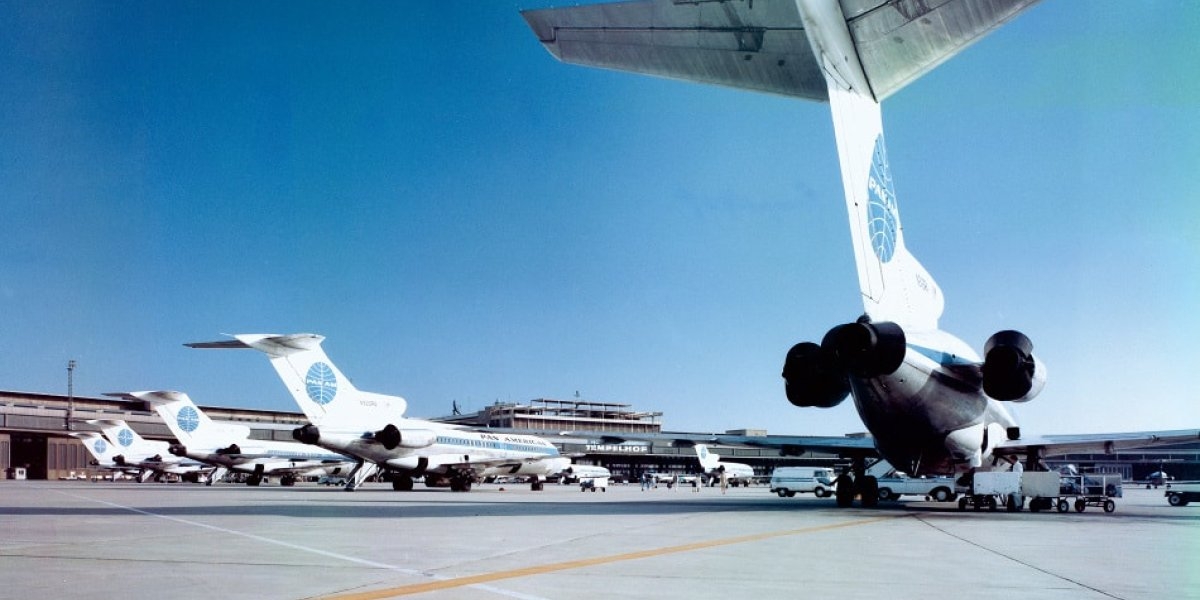PanAm at Berlin Tempelhof. Photocredit: Flughafen Berlin Brandenburg GmbH
Getting hooked on flying
Social practice theories deal with day-to-day activities that become ‘second nature’: we constantly do things without reflecting about them.
Max Koch
This article i part of the FLYWELL project. Read more of our stories here.
Just as with most other social practices there is nothing really natural about flying. Given that most human beings never fly, it takes special ‘training’ to make this look and feel normal and natural. Since major practice theorists such as Pierre Bourdieu put forward that this ‘orchestration of habitus’ happens especially during childhood and youth, I reflect here on my own socialization to flying in the 1970s.
My family were living in the West German federal state of Hesse when my parents got divorced and we then moved to West Berlin where my mother was from. It was 1974, I was eight years old, and the only way to visit my dad, who still lived in Hesse, was via airplane to Frankfurt am Main. This was of course due to the divided status of Germany and Berlin, which made it impossible for minors to take trains through the former East Germany. Flying to West Berlin was subsidized during the Cold War to facilitate personal contacts between the city and West Germany.
I must have been quite excited before going on my first unaccompanied flight. Flying was still a bit special at that time. Ticket prices (to other destinations than West Berlin) were higher than today, so most people did not do it all the time and, in many cases, dressed up for the occasion. I remember very friendly flight attendants (at the time nearly always female) on the ‘Pan American’ planes who literally took me and the other unaccompanied minors by the hand when boarding the plane and leaving it, giving us priority over all other passengers. We even received toys like plastic airplanes and were served light meals to make us feel as comfortable as possible.
What was exciting in the beginning soon became routine. I made this voyage about once a month for about five years: My mum would bring me to ‘Flughafen Tempelhof’ (historically knows as destination of the air lift to feed the West Berlin population during the Soviet blockade in 1948 and more recently as temporary refugee accommodation), I would play for an hour with the Pan American toys and/or have a light meal, and my dad would pick me up in Frankfurt airport for the weekend. After a few repetitions, flying to Frankfurt felt like the most normal thing to do, and I stopped thinking about it. What could only take place within a very specific historical and social context became a social practice as normal as getting on the local bus to get to school.
As a teenager, I made the trip less often and started taking the train. This was not due to ‘flight shame’; I was simply trying out something new. Later in life, especially when working in Northern Ireland, I flew frequently again to stay in contact with my family including my own daughter. And so do millions of other Westerners.
Breaking with an incorporated social practice is very hard. In my case, it took several years of conversation with my partner who became environmentally aware sooner than I did. Denial and the usual excuses were strong and not easily overcome: What difference would it make for the world if I stopped flying, etc.? I now see my story as rather typical for the Western middle class. Family and work diversify geographically, and the 'solution’ (never debated) is to take low-cost flights for short trips– albeit without the amenities of the 1970s.
